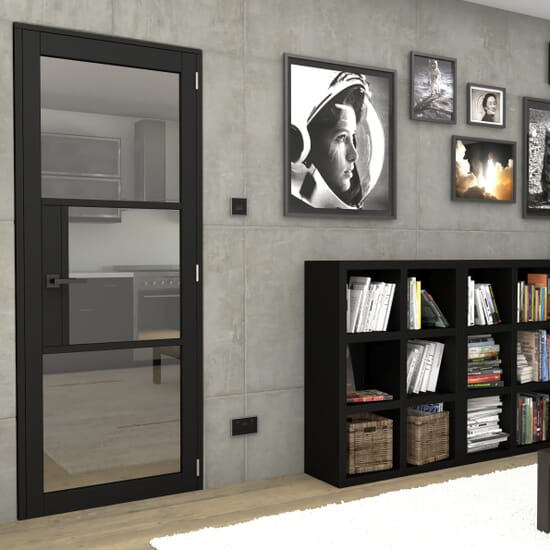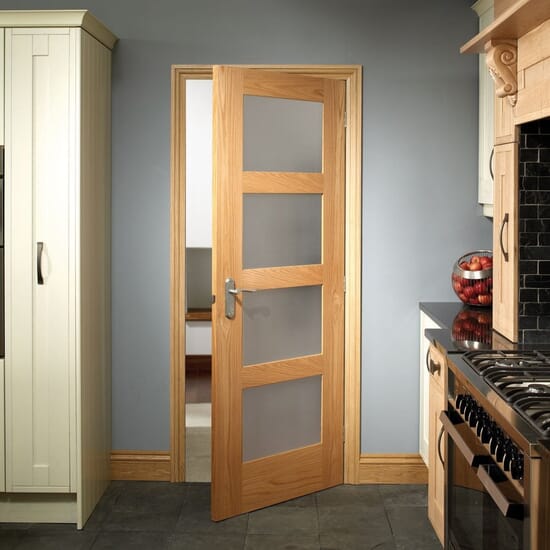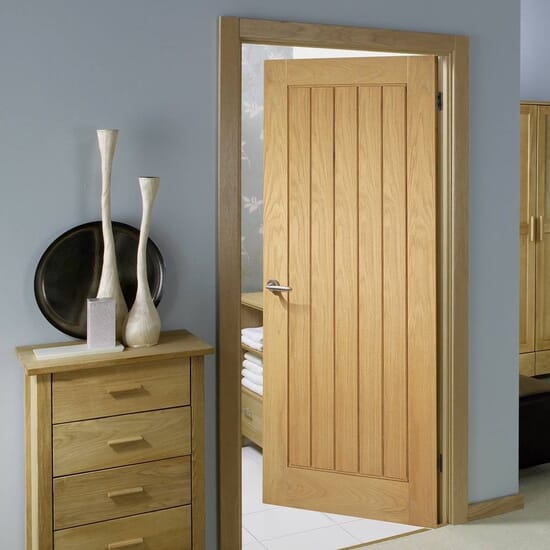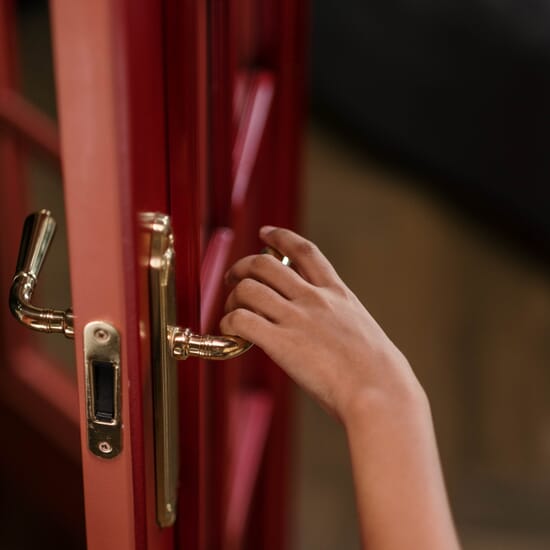Due to their size and relative ‘complexity’, it’s important that French doors are hung correctly. Here, we will explore some common issues that people have with French doors, and how to fix them.
My French doors let too much light through!
Many French doors are either have one large glass panel from top to bottom, or have several smaller panes of glass in them. In the summer, when you want to bask in the warmth of the sun and enjoy the added lightflow throughout your home, they're ideal. In the winter, when the sun is low in the sky and achieves little other than creating an annoying glare while you’re trying to work inside, you’ll want to block some of that sunlight out.
You have a few options here. Decorated glass panels or frosted glass can filter out some of that sunlight, and are a nice choice for modern homes if you want to combine ‘soft light’ with the privacy that frosted glass offers. The downside to this kind of glass is that it isn’t clear, and it can’t be changed easily – so you’re making a conscious decision to never be able to see through those windows. Frosted glass is better suited to internal French doors more so than external ones.
On the other hand, window dressings are more versatile when it comes to external French doors. You can raise and lower the blinds, open the shutters or tie back the curtains when you want to be able to see out of the door. You can swap the curtains out depending on what colours you want to match your interior decorating. In addition, window dressings add an extra layer of insulation, which can muffle sounds, keep heat in during the winter, and help to keep your rooms cooler in the summer too.
My French door scrapes the on floor when I open it
If you have had the same French folding doors for several years, then they may start to scrape the floor, sag, or even drop out of the rails/brackets. The good news is that this is an easy problem to fix, and with some basic maintenance you can get your doors tightened up, and keep them a pleasure to use for many years.
To fix a door that sags and scrapes across the floor, you’ll need to tighten up the hinges, and fix the top bracket as well. Ideally, your folding doors should have a 1/8th of an inch vertical gap between them, and an even space running along the top so that they don’t hit the jambs or the floor. To fix the doors, you will need:
- A 4-in-1 screwdriver
- An adjustable wrench
- Pliers
- Needle nose pliers
- Shims
- Silicone based lubricant
Begin by loosening the set screw which is located at the end of the top bracket. Slide the bracket slightly along the track – this will allow you to adjust the space between the top of the door. Tighten the screw and test the fit. You will need to do this for each door.
Next, adjust the position of the door in relation to the floor bracket. There is a pin in each of the bottom floor brackets, that lets you adjust the vertical gap between the bottom of the door and the floor. There are two main styles of bottom bracket. One version requires you to lift the door, then drop the pin into a different notch on the bracket to adjust the height. The other version requires you to loosen the screw and then slide it in or out. If you’re not sure what style you have, check the documentation that came with the door.
You can use the bottom pin to adjust the height of the door. With some designs, you will need to use a wrench to adjust the door, with others, you will need to use pliers. To make the job as easy as possible, carefully lift the door out of the track, and put shims underneath it to support the weight.
Once you have adjusted the height of the door, test it to see if it moves freely. If it does, then your job is done. If it no longer scrapes across the floor, but still feels stiff and difficult to move, then it could be that there is dirt in the tracks impeding the movement, or that the hinges are stiff. You should clean the tracks of your folding doors regularly to stop them from sticking. Simply vacuuming in the track with the correct narrow-nosed attachment will prevent a lot of problems. In addition, make lubricating the hinges with some WD-40 or a similar brand of aerosol lubricating spray a part of your maintenance routine, so that the hinges always move freely.
My French door swings closed after opening
If your door swings closed after opening, then this usually means that the hinge is not aligned correctly. Adjusting the hinges can fix this. With some door designs, this simply means tightening the screw in the hinge, with others, you will need to remove the pin and bend it slightly. Remember there will be two (sometimes three) hinges on each side. If a door is swinging shut, it is usually the top hinge that is out of alignment, leaving the door out of plumb.
If the door is far out of plumb, or the hinges aren’t directly above each other, then you may need to move the entire hinge leaf. You can test the alignment of the hinges (and the door) using a makeshift plumb line (a piece of string and a weight will do). Mark the position where the hinge should go, drill new pilot holes, and then replace the hinge and test the movement of the door.
I’m worried about my child running into the French doors and breaking the glass
First and foremost, all French doors, both internal and external, should have toughened safety glass as standard to meet UK building regulations. This means the glass is up to 5 times as stong as standard glass and should it break, it won't shatter into razor sharp shards but "nuggets" that are less likely to break the skin. Young children are inquisitive, but they’re not always that observant and they lack the understanding of the world to know that there are things that are ‘solid’ that you can see through. When a child is just learning to walk and run they might run into a glass door. A child is unlikely to break safety glass, but bumped heads are no fun either!
You can alert your child to the presence of the glass by adding stickers to it, especially at around eye level to them. One of the most common childproofing techniques is to add stickers to the glass. There are lots of wall and window sticker options to choose from, and they can be a smart, visually appealing addition to the door, even matching your wallpaper or existing decor.
Alternatively, you could opt for frosted glass doors to make the panels more noticeable.
In Summary
While it's not uncommon that your French folding door will need some adjustment over its lifespan, making sure its installed properly can minimise many problems. Check out our guide on how to install French doors.
View our full range of internal French doors and if you have any queries, our friendly team is here to help so get in touch.







